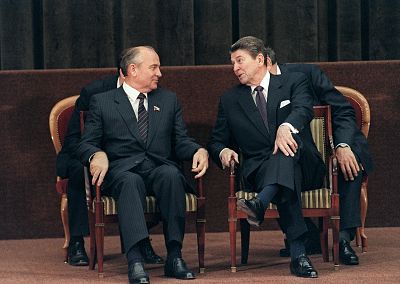Analysts say the current standoff can't be compared to the Cuban missile crisis — "the moment when the two superpowers came closest to nuclear conflict."
The standoff between President Donald Trump and Russia following an alleged chemical attack by Syria risks escalating into a military confrontation between Washington and Moscow, according to experts and former officials.
But Trump's claim that the showdown represents a new low point for relations between the U.S. and Russia — including the most terrifying days of the Cold War — was dismissed by many analysts Thursday as hyperbole.
On Wednesday, the president tweeted that Russia should "get ready" for U.S. airstrikes to be launched at its ally Syria, which is accused of launching another chemical attack on its own people.
Trump's comment followed a Russian diplomat's pledge that any U.S. missiles fired at Syria would be shot down and their launch sites targeted — an apparent threat toward American ships and aircraft.
In a subsequent social-media salvo, Trump said that "our relationship with Russia is worse now than it has ever been, and that includes the Cold War."
He later blamed this nadir on the administration of President Barack Obama, the Democrats, and the Russia investigation by special counsel Robert Mueller.
But experts like Keir Giles say Trump's comparison of the current situation to the Cold War is wrong.
"What next? The day after the strike, we're going to have killed a lot of Russians."
This period featured several incidents where the world appeared to be teetering on the brink of Armageddon.
Giles, who is a a senior consulting fellow at London's Chatham House think tank, highlighted that there were "periods of tension that were far worse than what we're experiencing now" during the Cold War — which lasted for 44 years between 1947 and the end of the Soviet Union in 1991.
The riskiest moment during this timeline was the Cuban missile crisis. This was the only time during the Cold War when U.S. forces were placed on DEFCON 2, in what the State Department's Office of the Historian calls "the moment when the two superpowers came closest to nuclear conflict."
The standoff over Syria isn't anywhere near that level. But that's not to say it's not serious.
Some analysts see the ongoing situation as the worst crisis since the end of the Cold War and perhaps since the start of the 1980s when U.S.-Soviet relations began improving.
"Relations between leading Western countries and Russia are as bad as they have been since the early 1980s," according to Duncan Allan, a former official with the British Foreign Office who worked in the U.K.'s embassies in Moscow and Kiev.
But even he tempered this comparison with caution.
"We are not dealing with the USSR, we're not dealing with a superpower," said Allan, who is now an associate fellow at Chatham House. "The Russians won't thank you for saying that, but they are not a superpower comparable to the United States."
It is still unclear what action Trump is planning to take in response to the chemical attack on a rebel enclave near Damascus over the weekend.
The president tweeted again Thursday pointing out that he "never said when an attack on Syria would take place. Could be very soon or not so soon at all!"
White House Press Secretary Sarah Sanders repeatedly told reporters that "all options are on the table."
Some analysts have expressed concern about what will happen if the U.S. launches strikes on Syria and kills Russian personnel stationed there.
"What next? The day after the strike, we're going to have killed a lot of Russians," retired Gen. Barry McCaffrey said on MSNBC late Wednesday. "We're in a very complex, very dangerous situation."
Justin Bronk, a research fellow at the Royal United Services Institute, or RUSI, said that the U.S. and its allies would do what they could to avoid hitting targets where Russians are based in Syria.
"I think it's enormously unlikely that Washington, London or Paris would prosecute targets where they thought there was a reasonable chance of Russians being killed," he said. "It's just too much of an escalation, I just don't think they'd do it."
One option might be to emulate last year's "pin prick" strike on Syria, in which the U.S. launched cruise missiles at a Syrian air base but caused minimal damage.












